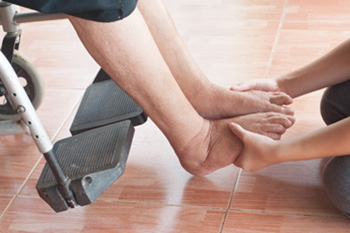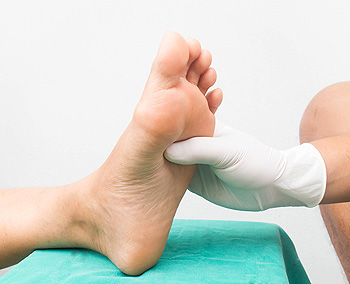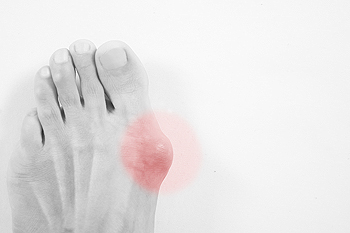159 North 3rd Street
Macclenny, Florida 32063

Foot and ankle problems are prevalent medical issues, particularly among the elderly, who often suffer from pain, stiffness, swelling, or deformities. Common diagnoses include conditions such as corns, athlete's foot, bunions, flat feet, ingrown nails, and warts. Aging-related muscle mass and loss of bone strength may increase seniors' risk for injuries and fractures, compounded by balance and vision issues. Key foot and ankle injuries in the elderly include ankle sprains, where the ligaments are overstretched or torn, potentially weakening the ankle and leading to arthritis, if untreated. Achilles tendonitis and tears are also common. The Achilles is vulnerable to inflammation and overuse, which can escalate to tears or ruptures, especially with sudden trauma. Ankle fractures are serious injuries from traumatic impact, requiring immediate podiatric attention to prevent complications such as infections. The spectrum of foot and ankle injuries in the elderly ranges from minor, treatable conditions to severe injuries necessitating medical intervention, highlighting the need for attentive care to prevent these issues. If you are elderly and have foot or ankle problems, it is suggested that you make an appointment with a podiatrist for a proper diagnosis and treatment.
Ankle pain can be caused by a number of problems and may be potentially serious. If you have ankle pain, consult with Dr. John L. Coleman from Florida. Our doctor will assess your condition and provide you with quality foot and ankle treatment.
Ankle pain is any condition that causes pain in the ankle. Due to the fact that the ankle consists of tendons, muscles, bones, and ligaments, ankle pain can come from a number of different conditions.
Causes
The most common causes of ankle pain include:
Symptoms
Symptoms of ankle injury vary based upon the condition. Pain may include general pain and discomfort, swelling, aching, redness, bruising, burning or stabbing sensations, and/or loss of sensation.
Diagnosis
Due to the wide variety of potential causes of ankle pain, podiatrists will utilize a number of different methods to properly diagnose ankle pain. This can include asking for personal and family medical histories and of any recent injuries. Further diagnosis may include sensation tests, a physical examination, and potentially x-rays or other imaging tests.
Treatment
Just as the range of causes varies widely, so do treatments. Some more common treatments are rest, ice packs, keeping pressure off the foot, orthotics and braces, medication for inflammation and pain, and surgery.
If you have any questions, please feel free to contact our office located in Macclenny, FL . We offer the newest diagnostic and treatment technologies for all your foot care needs.

Diabetes, a chronic condition affecting blood sugar levels, can significantly impact the health of your feet. Elevated blood sugar levels can lead to nerve damage, a condition known as diabetic neuropathy. As a result, individuals with diabetes may experience reduced sensation in their feet, making it challenging to detect injuries or infections. Poor circulation, another common consequence of diabetes, can slow down the healing process, increasing the risk of complications. Foot ulcers, a prevalent issue among those with diabetes, can develop from minor injuries or pressure points. Left untreated, these ulcers may lead to severe infections. Regular foot inspections, meticulous hygiene, and wearing proper footwear are crucial for preventing complications. It is important for Individuals with diabetes to prioritize foot care as an integral part of their overall health management, seeking prompt medical attention for any concerning symptoms to maintain optimal foot health. If you have diabetes, it is strongly suggested that you schedule regular appointments with a podiatrist who can help you to manage this condition.
Diabetic foot care is important in preventing foot ailments such as ulcers. If you are suffering from diabetes or have any other concerns about your feet, contact Dr. John L. Coleman from Florida. Our doctor can provide the care you need to keep you pain-free and on your feet.
Diabetic Foot Care
Diabetes affects millions of people every year. The condition can damage blood vessels in many parts of the body, especially the feet. Because of this, taking care of your feet is essential if you have diabetes, and having a podiatrist help monitor your foot health is highly recommended.
The Importance of Caring for Your Feet
Patients with diabetes should have their doctor monitor their blood levels, as blood sugar levels play such a huge role in diabetic care. Monitoring these levels on a regular basis is highly advised.
It is always best to inform your healthcare professional of any concerns you may have regarding your feet, especially for diabetic patients. Early treatment and routine foot examinations are keys to maintaining proper health, especially because severe complications can arise if proper treatment is not applied.
If you have any questions please feel free to contact our office located in Macclenny, FL . We offer the newest diagnostic and treatment technologies for all your foot and ankle needs.

A bunion, characterized by a bony protrusion at the base of the big toe, can significantly impact everyday activities, introducing challenges and discomfort into routine tasks. Walking, a fundamental activity, becomes hindered as the misalignment of the big toe alters the foot's natural biomechanics, leading to pain and difficulty finding suitable footwear. The act of standing or even simple weight-bearing activities may provoke increased pressure on the bunion, intensifying discomfort. Selecting appropriate shoes becomes a continual challenge, as the bony prominence may not comfortably fit into regular footwear, exacerbating the interference with daily life. Activities that involve prolonged periods of standing or walking may become sources of constant discomfort, affecting productivity and overall well-being. Recognizing the interference bunions can pose underscores the importance of proactive measures, including wearing comfortable shoes. If you have a bunion, it is suggested that you are under the care of a podiatrist who can provide you with relief and treatment strategies.
If you are suffering from bunion pain, contact Dr. John L. Coleman of Florida. Our doctor can provide the care you need to keep you pain-free and on your feet.
What Is a Bunion?
Bunions are painful bony bumps that usually develop on the inside of the foot at the joint of the big toe. As the deformity increases over time, it may become painful to walk and wear shoes. Women are more likely to exacerbate existing bunions since they often wear tight, narrow shoes that shift their toes together. Bunion pain can be relieved by wearing wider shoes with enough room for the toes.
Causes
Symptoms
In order to diagnose your bunion, your podiatrist may ask about your medical history, symptoms, and general health. Your doctor might also order an x-ray to take a closer look at your feet. Nonsurgical treatment options include orthotics, padding, icing, changes in footwear, and medication. If nonsurgical treatments don’t alleviate your bunion pain, surgery may be necessary.
If you have any questions, please feel free to contact our office located in Macclenny, FL . We offer the newest diagnostic and treatment technologies for all your foot care needs.

Plantar fasciitis is a common reason for long-lasting heel pain. It can affect both active, young people and older people who do not move as much. This condition happens when the plantar fascia, a band of tissue in the foot, is repeatedly strained. It is often linked to tight calf muscles. Podiatrists can generally diagnose this condition by talking to the patient and examining their foot. They only use imaging tests if the case is unusual or does not get better with initial treatment. The main symptom is a sore heel, especially when taking the first steps in the morning or after sitting for a while. Treatment involves changing activities and stretching the calf and foot. Special shoe inserts that support and cushion the heel can also help. If pain continues after six months, podiatrists may suggest less invasive treatments or even surgery. These treatments help the body heal itself or relieve pain. However, some injections, while they reduce pain, could also weaken the foot tissue. Surgery options involve releasing tension in the calf or making small cuts in the plantar fascia to encourage healing. If you have chronic plantar fasciitis, it is suggested that you make an appointment with a podiatrist who can determine what the best treatment options are for you.
Plantar fasciitis can be very painful and inconvenient. If you are experiencing heel pain or symptoms of plantar fasciitis, contact Dr. John L. Coleman from Florida. Our doctor can provide the care you need to keep you pain-free and on your feet.
What Is Plantar Fasciitis?
Plantar fasciitis is the inflammation of the thick band of tissue that runs along the bottom of your foot, known as the plantar fascia, and causes mild to severe heel pain.
What Causes Plantar Fasciitis?
How Can It Be Treated?
While very treatable, plantar fasciitis is definitely not something that should be ignored. Especially in severe cases, speaking to your doctor right away is highly recommended to avoid complications and severe heel pain. Your podiatrist can work with you to provide the appropriate treatment options tailored to your condition.
If you have any questions please feel free to contact our office located in Macclenny, FL . We offer the newest diagnostic and treatment technologies for all your foot and ankle needs.